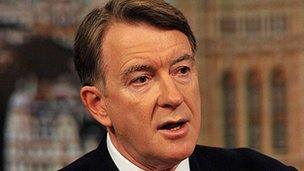Miliband struggling with economy message - Mandelson
- Published

Lord Mandelson said he would not make his 1998 "filthy rich" comments now
Ed Miliband is "struggling" with his economic message at a time when the public largely backs "austerity rhetoric", Lord Mandelson has said.
The former Labour minister said Mr Miliband had an "unenviable job" but was "doing well in the circumstances".
He warned Labour against indulging in "too much business and bank bashing".
But he also said he was concerned about wealth inequalities and would not repeat a 1998 comment about it being fine for people to be "filthy rich".
Lord Mandelson told BBC Radio 4's Today programme that Labour - in keeping with other left of centre parties in Europe - was having a tough time responding to the debt crisis.
"I think what has happened, in the main, is that the right wing have been better at handling the rhetoric of austerity, cutting back and deficit reduction which is broadly speaking where the public have been...
"There has been a marrying up of right-wing rhetoric and what the public thinks is necessary."
'Labour legacy'
Although public support for austerity might not be sustainable, he said centre-left parties had to rebut the charge that they had been "profligate" and "wasteful" in the past.
"The centre-left have to fight back. But not by reverting to the old arguments about state control and intervention and not, in my view, by employing too much of the new rhetoric on the left of business and bank bashing.
"I don't think that is really going to get them anywhere at all."
Lord Mandelson dismissed questions about Mr Miliband's leadership, saying he found such talk "tedious and boring", but suggested the opposition leader faced a major challenge.
"Ed Miliband is struggling with two things... and they are not easy," he added. "In making an argument opposing what the government is doing in fighting the recession, he is also struggling with his own inherited legacy from the previous Labour government and they are not doing that either easily or finely, nor is it simple to do.
"And at exactly the same time, he is struggling to invent a new left-of-centre political paradigm that is not New Labour but takes lessons and experiences from the last 15 years... which revisits the issues to do with markets and inequalities and responsible capitalism to invent a new left-of-centre politics for the 21st Century.
"He is trying to do these things simultaneously... at a time when not very many people are giving him the benefit of the doubt. It is a rather unenviable job which I think he is doing well in the circumstances but it is not easy."
'Filthy rich'
Lord Mandelson said he was "much more concerned" about widening inequalities than he had been in the past since it was clear globalisation was not delivering the economic benefits that politicians "took for granted" in the 1990s.
In the early days of the first Blair government, Lord Mandelson attracted headlines when he said that he was "intensely relaxed" about people getting "filthy rich" as long as they paid their taxes.
Asked about these remarks, he suggested they had been "spontaneous" and "unthought off", and said they were made in the context of a conversation with an American businessman who wanted to invest in the UK but who had questioned Labour's past hostility to financial markets and wealth creation.
But he added: "I don't think I would say that now. Why? Because, among other things, we have seen that globalisation has not generated the rising incomes for all, the benefits from globalisation that should come from rising prosperity and living standards... that we assumed globalisation would drive.
"We have learnt that markets, while indispensable to global growth, can become volatile and unstable and have to be managed and regulated and that globalisation is also generating income inequalities within and between countries that we simply cannot and should not live with."
Lord Mandelson, who has contributed to a study by the IPPR think tank on the impact of globalisation, stood down from front line politics after the 2010 general election.
- Published25 January 2012
- Published19 January 2012
- Published18 January 2012